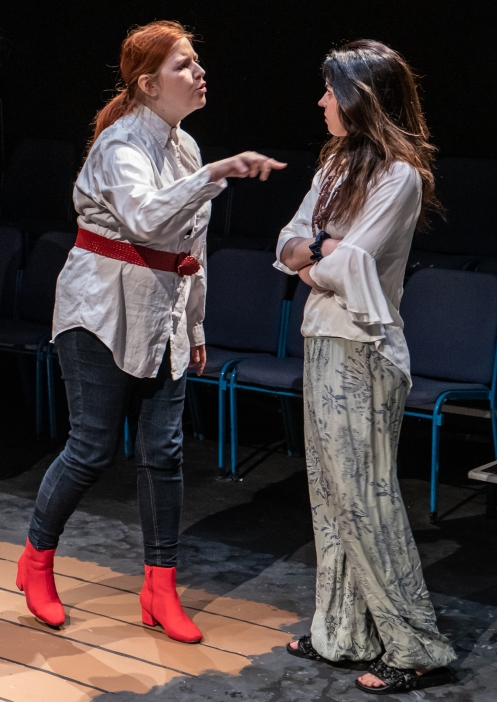Future Conditional
Claws Analysis
Future Conditional
By Tamsin Oglesby
Questors Academy at The Studio, Ealing until 6th April
Review by Eleanor Lewis
“Adults are only children grown up”, was a saying my mother, a primary school teacher, occasionally came out with. On the face of it a statement of the blindingly obvious, but what she meant was that if you look hard enough at the adult, you can often see the child they were. She had another one: “Everyone goes to school”, by which she meant that if you’re in the state system you don’t get to pick who your child makes friends with. The second is, I think, in the minds of more parents than care to admit it but both these observations came back to me whilst watching Questors’ highly entertaining production of Tamsin Oglesby’s play Future Conditional.
There are child characters in this work but only one, Alia a refugee from Pakistan, is present on stage. Resilient and highly intelligent, Alia lives with a foster family and arrives at a British school where she meets Mr Crane, an overworked, overstressed but still committed English teacher. Throughout the play, action shifts to and fro from classroom to playground, a government think tank, a café and an Oxford college, each location suggested by childlike, crayon sketches projected on a screen. Alia, played by Sunaina McCarthy with exactly the right mix of naïveté and sizzling intellect, appears from time to time, pulling the narrative along.

In the playground, mothers from different backgrounds extract information from each other as to whose child has a tutor or is taking up an obscure musical instrument to make him more attractive to the private school. There are two fathers, one pretends to be constantly on the phone, the other has little input but all the parents are deeply neurotic about which school their children will go to, with the possible exception of Kaye who is more devoted to her dog than her child. Friends on the surface, they are ruthless competitors on behalf of their children until they are thrown into solidarity by a combination of guilt and desperation. One then tells another about the website which will fake council tax bills so you can prove an address; another, no longer able to afford school fees, engineers her child’s now empty place for her friend’s daughter who doesn’t approve of private education, but can’t face the choice of state school she’s been offered.

Several actors were playing two characters. Matthew Saldanha, Ruth Comerford and Nicola Amory, all with two roles made each of them particularly distinct, but every actor on stage produced a strong, well-observed performance. The mothers, each with a basic identity – hippy, yummy mummy, dog-obsessed, etc – did not perform as caricatures. Lucy Palfreyman, as Suzy, did a sterling job of representing the parent who’s trying to do the honourable thing and use the system as it’s supposed to be used. She also delivered the line that sums up the whole sorry scenario: “You expect the system to work don’t you, but it doesn’t, you have to work the system.”

The Education and Equalities Commission, whilst searching for ways to improve the way the British do education, neatly provided us with an image of how we as adults have to account for our education: the Eton old boy is generally despised and the grammar school girl is apologetic (what’s that myth about it not being your fault where you went to school?). In an attempt to make progress, the Commission invites a child who’s actually in school to its meetings. Alia is, of course, the child. She is oblivious to festering British class issues (when she discovers the Eton-educated policy advisor is not the only public schoolboy in the room, she joyfully announces “Ah, you’re from the same tribe!”) and her logical approach actually provides them with a solution (no spoilers) which they cannot handle and which ultimately results in a full-on flapjack fight (front row audience, take cover), adults being, as we know, only children grown up. Bradley Peake and Joshua Perry were totally convincing and very entertaining as two sides of the educational divide, their contempt for each other barely contained, but not quite as simple as either of them thought. Credit must also go to Tony Sears who will be on sugar-overload by the end of the run.

There was an equality to this cast and their level of performance which makes focussing on individuals unfair. That said, William Busby’s Crane was an endearing, accurate and completely unsentimental portrayal of an exhausted teacher, still on the side of his students even as he reached peak frustration resisting a senior manager’s insistence that he apologise to a parent whose child has abused him. Crane was often on stage on his own, talking to an invisible class. It was some distance from Joyce Grenfell’s George, Don’t Do That but still laugh-out-loud funny. Richard Gallagher’s perfectly paced direction was seamless and made the whole thing work beautifully.
Doing the best for your child in an education system that is complex and quite mysterious in many ways is a challenge no parent looks forward to. Education at its core though – children forced into an environment they don’t want to be in whilst adults try desperately to equip them for a world that will cut them no slack once they arrive in it – has always been a comedy gold mine, from Willy Russell’s Our Day Out, to today’s Derry Girls. Writing about the British system is perhaps only slightly easier than trying to write about Brexit, but Future Conditional is both hugely funny and as informative as it is possible to be about how our system works, or is worked. This is Team Questors at peak fitness, and this production is splendid. Highly recommended.
Eleanor Lewis
March 2019
